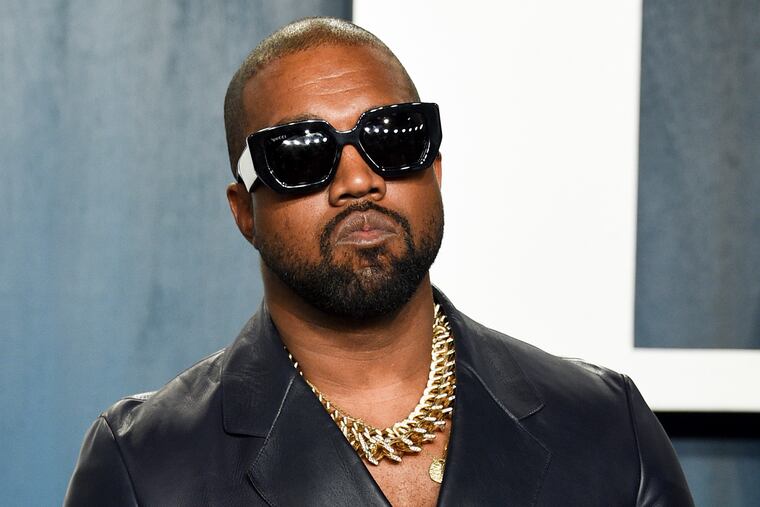Twitter, Instagram block Kanye West over antisemitic posts
The rapper has been locked out of his accounts on those platforms for violating their policies.

NEW YORK — Kanye West once suggested slavery was a choice. He called the COVID-19 vaccine “the mark of the beast.” Earlier this month, he was criticized for wearing a “White Lives Matter” T-shirt to his collection at Paris Fashion Week.
Now the rapper who is legally known as Ye is again embroiled in controversy — locked out of Twitter and Instagram over antisemetic posts that the social networks said Sunday violated their policies. In one post on Twitter, Ye said he would soon go “death con 3 on JEWISH PEOPLE,” according to internet archive records, making an apparent reference to the U.S. defense readiness condition scale known as DEFCON.
“You guys have toyed with me and tried to black ball anyone whoever opposes your agenda,” he said in the same tweet posted late Saturday, which was removed by Twitter.
The comment drew a sharp rebuke from the Anti-Defamation League, which called the tweet “deeply troubling, dangerous, and antisemitic, period.”
“There is no excuse for his propagating of white supremacist slogans and classic antisemitism about Jewish power, especially with the platform he has,” a statement said.
Representatives for Ye did not return requests for comment.
Ye has alienated even ardent fans in recent years, teasing and long tinkering with albums that haven’t been met with the critical or commercial success of his earlier recordings. Those close to him, like ex-wife Kim Kardashian and her family, have ceased publicly defending him after the couple’s bitter divorce and his unsettling posts about her recent relationship with comedian Pete Davidson.
But the social media lockouts cap a whirlwind week for Ye, even by his standards. On Oct. 3 he wore a “White Lives Matter” T-shirt while debuting his latest fashion line in Paris, prompting harsh criticism. According to the Southern Poverty Law Center, which tracks hate groups, White Lives Matter is a neo-Nazi group.
Rapper Sean “Diddy” Combs posted a video on Instagram saying he didn’t support the shirt, and urged people not to buy it. On Instagram, Ye posted a screenshot of a text conversation with Diddy and suggested he was controlled by Jewish people, according to media reports.
» READ MORE: From 2018: We're worried about Kanye West, but it might already be too late | Dan DeLuca
Adidas said Thursday that it was placing its lucrative sneaker deal with Ye under review. And on Saturday, Instagram locked out posts by the rapper-entrepreneur over content violations. His Twitter account was locked Sunday, just a day after he returned to the platform following a nearly two-year hiatus and was welcomed back by Elon Musk.
“Welcome back to Twitter, my friend,” posted Musk, who last week renewed his $44 billion offer to buy Twitter following a monthslong legal battle with the company. The billionaire and Tesla CEO has said he would remake Twitter into a free speech haven and relax restrictions, although it’s impossible to know precisely how he would run the influential network if he were to take over.
The social media policies for Twitter and Instagram prohibit posting offensive language.
Ye’s Twitter account is still active but he can’t post until the lockout ends. Sanctions by Meta, which owns Facebook and Instagram, may include temporary restrictions on posting, commenting or sending direct messages. Such muzzles can last as little as 12 hours or for days, depending on how serious the violation was or how many other times the account broke the rules.
While a step below a full account suspension, enough of these restrictions can eventually lead to a person being kicked off of the social media platforms — temporarily or, in rare circumstances, permanently.
As of Monday afternoon, neither account had posted anything, indicating that Ye is still restricted. Neither Twitter nor Meta would say how long they will restrict Ye’s accounts — or how close he might be to becoming suspended or even permanently booted.
Ye has earned a reputation less for his music and more for stirring up controversy since 2016, when he was hospitalized in Los Angeles because of what his team called stress and exhaustion. It was later revealed that he had been diagnosed with bipolar disorder.
That year, he ended a show in Sacramento, California, after just four songs but not before a 10-minute tirade about Beyoncé, Jay-Z, Hillary Clinton, Mark Zuckerberg, the radio and MTV. West soon decided to scrap the entire tour.
Since then he has regularly made headlines: Running for president, continuing his running feud with Taylor Swift, causing an uproar when he suggested slavery was a choice, publicly defending R. Kelly and once inviting Marilyn Manson and DaBaby on stage with him as they faced sexual assault and anti-gay allegations, respectively.
Ye’s involvement aside, social media restrictions like this incident have been largely routine for the platforms. Twitter took action on nearly 4.3 million accounts between July and December of 2021, the latest available data from a transparency report it publishes twice a year. About 1.3 million accounts were suspended in the same period.
But with Twitter on the likely brink of being sold to Musk, advocacy groups fear the platform will revert back to the days when it was known as a cesspool of abuse and hate, especially for women, minorities and members of the LGBTQ community. While there is still hateful content on Twitter, the company has spent years trying to detect and remove threats, abuse, racism, violence and other harmful material.